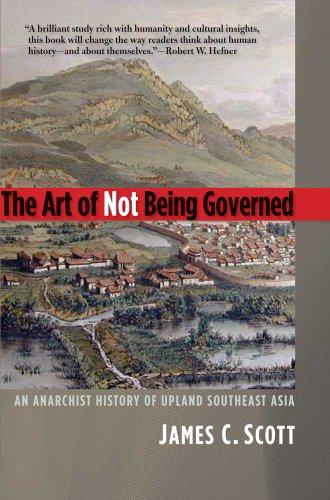The Art of Not Being Governed
An Anarchist History of Upland Southeast Asia
By James C. Scott

"The Art of Not Being Governed" is published by Yale University Press in 2009 - New Haven, USA, it has 442 pages and the language of the book is English.
“The Art of Not Being Governed” Metadata:
- Title: The Art of Not Being Governed
- Author: James C. Scott
- Language: English
- Number of Pages: 442
- Publisher: Yale University Press
- Publish Date: 2009
- Publish Location: New Haven, USA
“The Art of Not Being Governed” Subjects and Themes:
- Subjects: ➤ Politics and government - Rural conditions - Peasantry - Ethnology - Political activity - Peasants - Minority Studies - Anthropology - Discrimination & Race Relations - Ethnology, asia - Peasants, asia - Southeast asia, politics and government - Southern states, rural conditions - Southeast asia, social conditions - Anarchism - Staat - Bergbewohner - Politieke macht - Plattelandsbevolking - Platteland - Indigenous peoples - Government relations - Ethnology--southeast asia - Peasants--political activity - Peasants--political activity--southeast asia - Indigenous peoples--government relations - Indigenous peoples--southeast asia--government relations - Ds523.3 .s36 2009 - 305.800959 - 15.75
- Places: Southeast Asia - Zomia
- Time: 1945-
Edition Specifications:
- Format: Hardcover
- Dimensions: 24 x x centimeters
- Pagination: xviii, 442p.
Edition Identifiers:
- Google Books ID: AnKAmAEACAAJ
- The Open Library ID: OL24604468M - OL2692034W
- Online Computer Library Center (OCLC) ID: 1162366971 - 301948134
- Library of Congress Control Number (LCCN): 2009003004
- ISBN-13: 9780300152289 - 9780300156522
- ISBN-10: 0300152280
- All ISBNs: 0300152280 - 9780300152289 - 9780300156522
AI-generated Review of “The Art of Not Being Governed”:
"The Art of Not Being Governed" Table Of Contents:
- 1- Preface
- 2- Hills, Valleys, and States: An Introduction to Zomia
- 3- State Space: Zones of Governance and Appropriation
- 4- Concentrating Manpower and Grain: Slavery and Irrigated Rice
- 5- Civilization and the Unruly
- 6- Keeping the State at a Distance: The Peopling of the Hills
- 7- State Evasion, State Prevention: The Culture and Agriculture of Escape
- 8- Orality, Writing, and Texts
- 9- Ethnogenesis: A Radical Constructionist Case
- 10- Prophets of Renewal
- 11- Conclusion
- 12- Notes
- 13- Glossary
- 14- Index
"The Art of Not Being Governed" Description:
The Open Library:
James Scott, recognized worldwide as an eminent authority in Southeast Asian, peasant, and agrarian studies, tells the story of the peoples of Zomia and their unlikely odyssey in search of self-determination. He redefines our views on Asian politics, history, demographics, and even our fundamental ideas about what constitutes civilization, and challenges us with a radically different approach to history that presents events from the perspective of stateless peoples and redefines state-making as a form of “internal colonialism.” This new perspective requires a radical reevaluation of the civilizational narratives of the lowland states. Scott’s work on Zomia represents a new way to think of area studies that will be applicable to other runaway, fugitive, and marooned communities, be they Gypsies, Cossacks, tribes fleeing slave raiders, Marsh Arabs, or San-Bushmen. (Source: [Yale University Press](https://yalebooks.yale.edu/book/9780300169171/art-not-being-governed))
Open Data:
For two thousand years the disparate groups that now reside in Zomia (a mountainous region the size of Europe that consists of portions of seven Asian countries) have fled the projects of the organized state societies that surround them-slavery, conscription, taxes, corvée labor, epidemics, and warfare. This book, essentially an “anarchist history,” is the first-ever examination of the huge literature on state-making whose author evaluates why people would deliberately and reactively remain stateless. Among the strategies employed by the people of Zomia to remain stateless are physical dispersion in rugged terrain; agricultural practices that enhance mobility; pliable ethnic identities; devotion to prophetic, millenarian leaders; and maintenance of a largely oral culture that allows them to reinvent their histories and genealogies as they move between and around states.In accessible language, James Scott, recognized worldwide as an eminent authority in Southeast Asian, peasant, and agrarian studies, tells the story of the peoples of Zomia and their unlikely odyssey in search of self-determination. He redefines our views on Asian politics, history, demographics, and even our fundamental ideas about what constitutes civilization, and challenges us with a radically different approach to history that presents events from the perspective of stateless peoples and redefines state-making as a form of “internal colonialism.” This new perspective requires a radical reevaluation of the civilizational narratives of the lowland states. Scott’s work on Zomia represents a new way to think of area studies that will be applicable to other runaway, fugitive, and marooned communities, be they Gypsies, Cossacks, tribes fleeing slave raiders, Marsh Arabs, or San-Bushmen
Read “The Art of Not Being Governed”:
Read “The Art of Not Being Governed” by choosing from the options below.
Search for “The Art of Not Being Governed” downloads:
Visit our Downloads Search page to see if downloads are available.
Borrow "The Art of Not Being Governed" Online:
Check on the availability of online borrowing. Please note that online borrowing has copyright-based limitations and that the quality of ebooks may vary.
- Is Online Borrowing Available: Yes
- Preview Status: restricted
- Check if available: The Open Library & The Internet Archive
Find “The Art of Not Being Governed” in Libraries Near You:
Read or borrow “The Art of Not Being Governed” from your local library.
- The WorldCat Libraries Catalog: Find a copy of “The Art of Not Being Governed” at a library near you.
Buy “The Art of Not Being Governed” online:
Shop for “The Art of Not Being Governed” on popular online marketplaces.